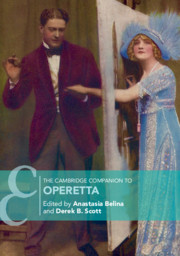Book contents
- The Cambridge Companion to Operetta
- Cambridge Companions to Music
- The Cambridge Companion to Operetta
- Copyright page
- Contents
- Illustrations
- Tables
- Music Examples
- Notes on Contributors
- Chronology, 1855–1950
- Introduction
- Part I Early Centres of Operetta
- Part II The Global Expansion of Operetta
- Part III Operetta since 1900
- 12 The Operetta Factory: Production Systems of Silver-Age Vienna
- 13 Berlin Operetta
- 14 Operetta in Italy
- 15 Operetta in Warsaw
- 16 British Operetta after Gilbert and Sullivan
- 17 Operetta During the Nazi Regime
- 18 Operetta Films
- 19 Australian Director Barrie Kosky on the Subversiveness of a Predominantly Jewish Genre: An Interview by Ulrich Lenz
- Select Bibliography
- Index
- References
12 - The Operetta Factory: Production Systems of Silver-Age Vienna
from Part III - Operetta since 1900
Published online by Cambridge University Press: 14 November 2019
- The Cambridge Companion to Operetta
- Cambridge Companions to Music
- The Cambridge Companion to Operetta
- Copyright page
- Contents
- Illustrations
- Tables
- Music Examples
- Notes on Contributors
- Chronology, 1855–1950
- Introduction
- Part I Early Centres of Operetta
- Part II The Global Expansion of Operetta
- Part III Operetta since 1900
- 12 The Operetta Factory: Production Systems of Silver-Age Vienna
- 13 Berlin Operetta
- 14 Operetta in Italy
- 15 Operetta in Warsaw
- 16 British Operetta after Gilbert and Sullivan
- 17 Operetta During the Nazi Regime
- 18 Operetta Films
- 19 Australian Director Barrie Kosky on the Subversiveness of a Predominantly Jewish Genre: An Interview by Ulrich Lenz
- Select Bibliography
- Index
- References
Summary
Operettas and their creation have long been considered a system of standardized production. This chapter examines the ‘operetta industry’ as it developed in Vienna around 1900 with a focus on theatrical production practice and the ways it shaped the genre’s artistic development. Sources include librettos, periodicals, archival sources and Operettenkönige, a backstage operetta novel of unknown authorship, published in 1911. Vienna’s operetta circle was a self-contained, vertically integrated system which controlled all aspects of operetta composition and production, from the mentorship of young composers to press reception and the publication and export of successful works. Critics saw this regulation as an impediment to artistic innovation, but to insiders the high level of control was necessary to set genre conventions. For them, innovation belonged in the small-scale, self-conscious manipulation of these norms. While lucrative and popular, the industry did not often easily respond to large-scale change, and eventually became so highly leveraged that a single unsuccessful season could put a major theatre out of business. As operetta declined in favour of the revue and film, the industry disintegrated.
- Type
- Chapter
- Information
- The Cambridge Companion to Operetta , pp. 189 - 204Publisher: Cambridge University PressPrint publication year: 2019

